A Reflective Essay on Experience of Caring for an Obese Adolescent
VerifiedAdded on 2023/06/04
|5
|1955
|336
AI Summary
This reflective essay describes the experience of caring for an obese adolescent and the impact of obesity on teenagers. The author discusses the importance of parental support and confidentiality in nursing care. The essay also highlights the need for nurses to be aware of the link between obesity and depression, and to involve patients in their own care plans.
Contribute Materials
Your contribution can guide someone’s learning journey. Share your
documents today.
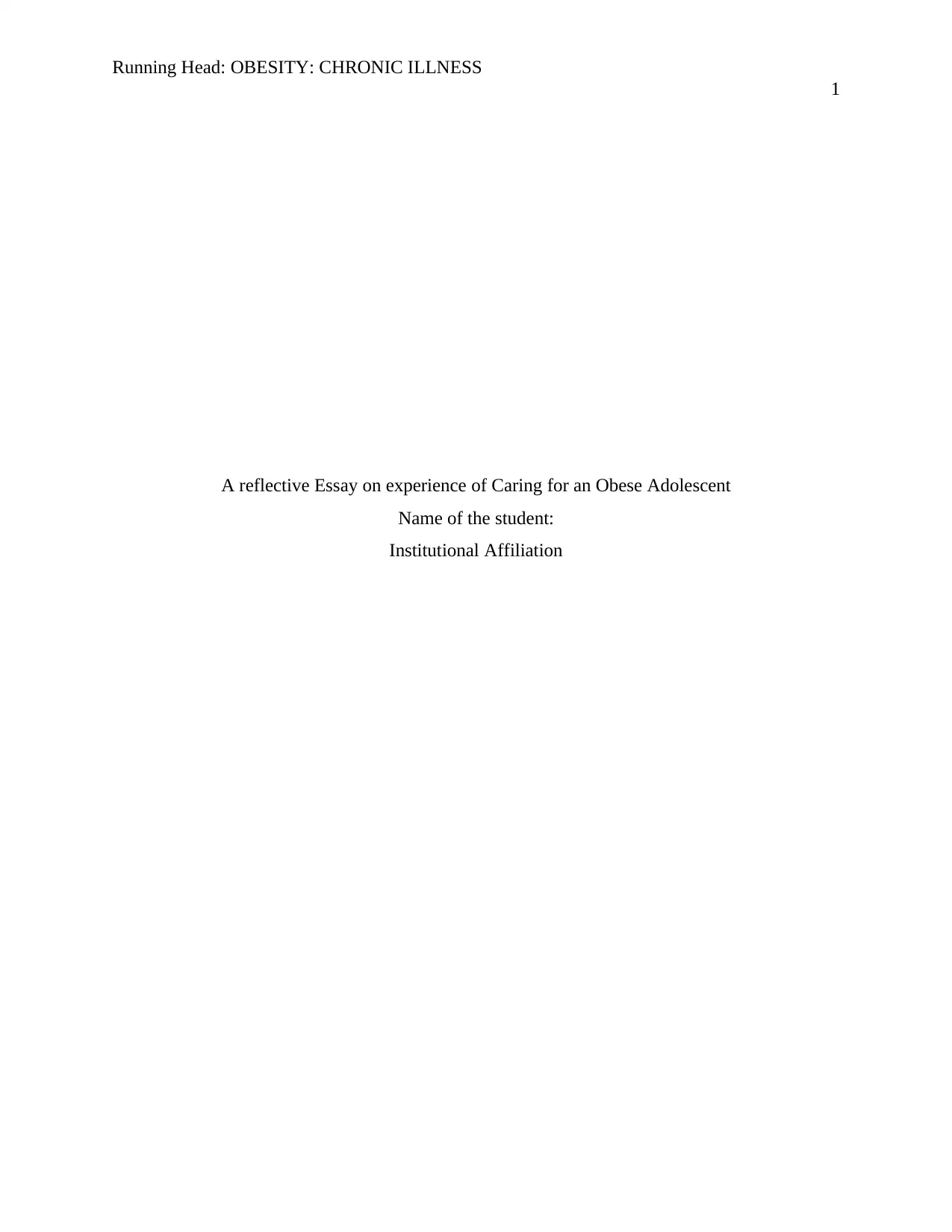
Running Head: OBESITY: CHRONIC ILLNESS
1
A reflective Essay on experience of Caring for an Obese Adolescent
Name of the student:
Institutional Affiliation
1
A reflective Essay on experience of Caring for an Obese Adolescent
Name of the student:
Institutional Affiliation
Secure Best Marks with AI Grader
Need help grading? Try our AI Grader for instant feedback on your assignments.
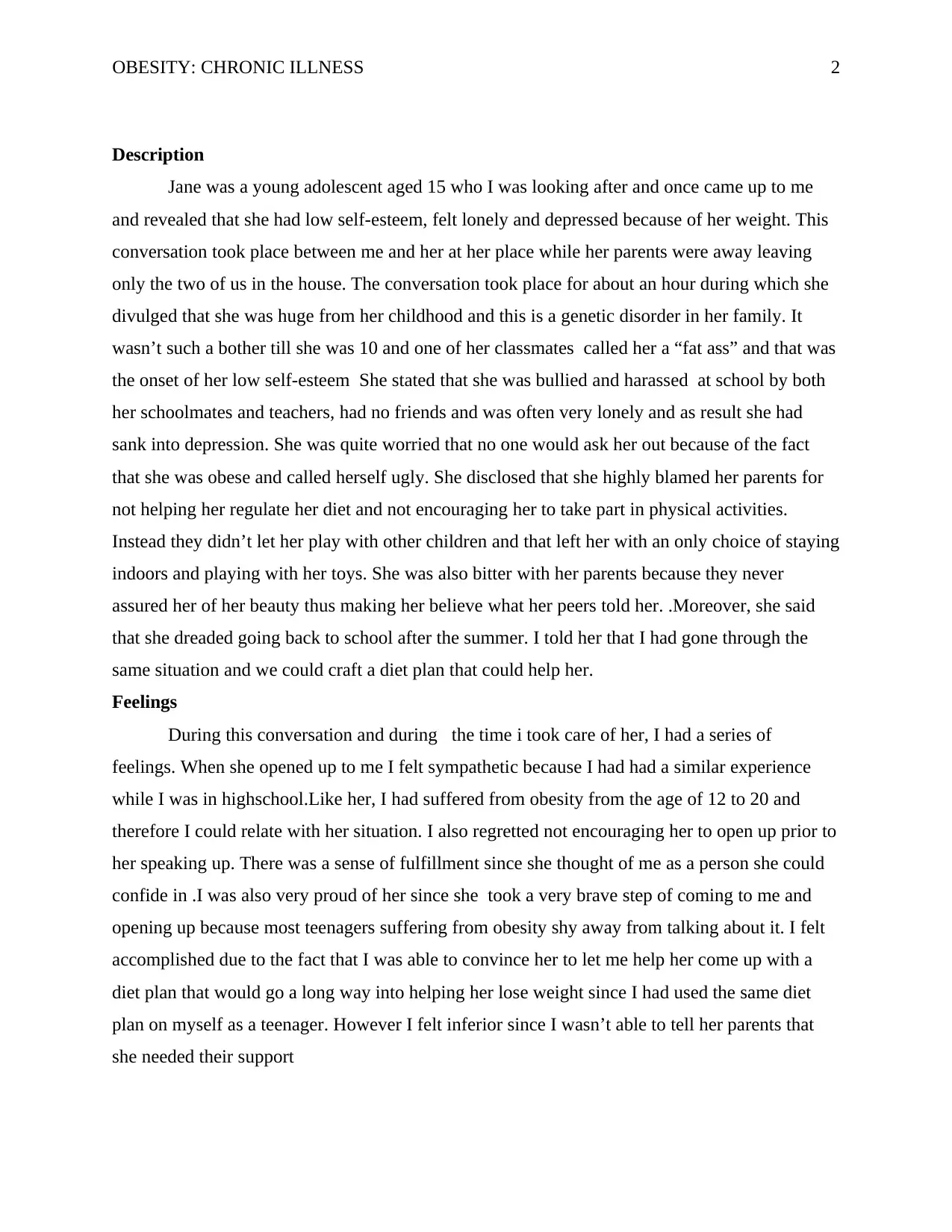
OBESITY: CHRONIC ILLNESS 2
Description
Jane was a young adolescent aged 15 who I was looking after and once came up to me
and revealed that she had low self-esteem, felt lonely and depressed because of her weight. This
conversation took place between me and her at her place while her parents were away leaving
only the two of us in the house. The conversation took place for about an hour during which she
divulged that she was huge from her childhood and this is a genetic disorder in her family. It
wasn’t such a bother till she was 10 and one of her classmates called her a “fat ass” and that was
the onset of her low self-esteem She stated that she was bullied and harassed at school by both
her schoolmates and teachers, had no friends and was often very lonely and as result she had
sank into depression. She was quite worried that no one would ask her out because of the fact
that she was obese and called herself ugly. She disclosed that she highly blamed her parents for
not helping her regulate her diet and not encouraging her to take part in physical activities.
Instead they didn’t let her play with other children and that left her with an only choice of staying
indoors and playing with her toys. She was also bitter with her parents because they never
assured her of her beauty thus making her believe what her peers told her. .Moreover, she said
that she dreaded going back to school after the summer. I told her that I had gone through the
same situation and we could craft a diet plan that could help her.
Feelings
During this conversation and during the time i took care of her, I had a series of
feelings. When she opened up to me I felt sympathetic because I had had a similar experience
while I was in highschool.Like her, I had suffered from obesity from the age of 12 to 20 and
therefore I could relate with her situation. I also regretted not encouraging her to open up prior to
her speaking up. There was a sense of fulfillment since she thought of me as a person she could
confide in .I was also very proud of her since she took a very brave step of coming to me and
opening up because most teenagers suffering from obesity shy away from talking about it. I felt
accomplished due to the fact that I was able to convince her to let me help her come up with a
diet plan that would go a long way into helping her lose weight since I had used the same diet
plan on myself as a teenager. However I felt inferior since I wasn’t able to tell her parents that
she needed their support
Description
Jane was a young adolescent aged 15 who I was looking after and once came up to me
and revealed that she had low self-esteem, felt lonely and depressed because of her weight. This
conversation took place between me and her at her place while her parents were away leaving
only the two of us in the house. The conversation took place for about an hour during which she
divulged that she was huge from her childhood and this is a genetic disorder in her family. It
wasn’t such a bother till she was 10 and one of her classmates called her a “fat ass” and that was
the onset of her low self-esteem She stated that she was bullied and harassed at school by both
her schoolmates and teachers, had no friends and was often very lonely and as result she had
sank into depression. She was quite worried that no one would ask her out because of the fact
that she was obese and called herself ugly. She disclosed that she highly blamed her parents for
not helping her regulate her diet and not encouraging her to take part in physical activities.
Instead they didn’t let her play with other children and that left her with an only choice of staying
indoors and playing with her toys. She was also bitter with her parents because they never
assured her of her beauty thus making her believe what her peers told her. .Moreover, she said
that she dreaded going back to school after the summer. I told her that I had gone through the
same situation and we could craft a diet plan that could help her.
Feelings
During this conversation and during the time i took care of her, I had a series of
feelings. When she opened up to me I felt sympathetic because I had had a similar experience
while I was in highschool.Like her, I had suffered from obesity from the age of 12 to 20 and
therefore I could relate with her situation. I also regretted not encouraging her to open up prior to
her speaking up. There was a sense of fulfillment since she thought of me as a person she could
confide in .I was also very proud of her since she took a very brave step of coming to me and
opening up because most teenagers suffering from obesity shy away from talking about it. I felt
accomplished due to the fact that I was able to convince her to let me help her come up with a
diet plan that would go a long way into helping her lose weight since I had used the same diet
plan on myself as a teenager. However I felt inferior since I wasn’t able to tell her parents that
she needed their support
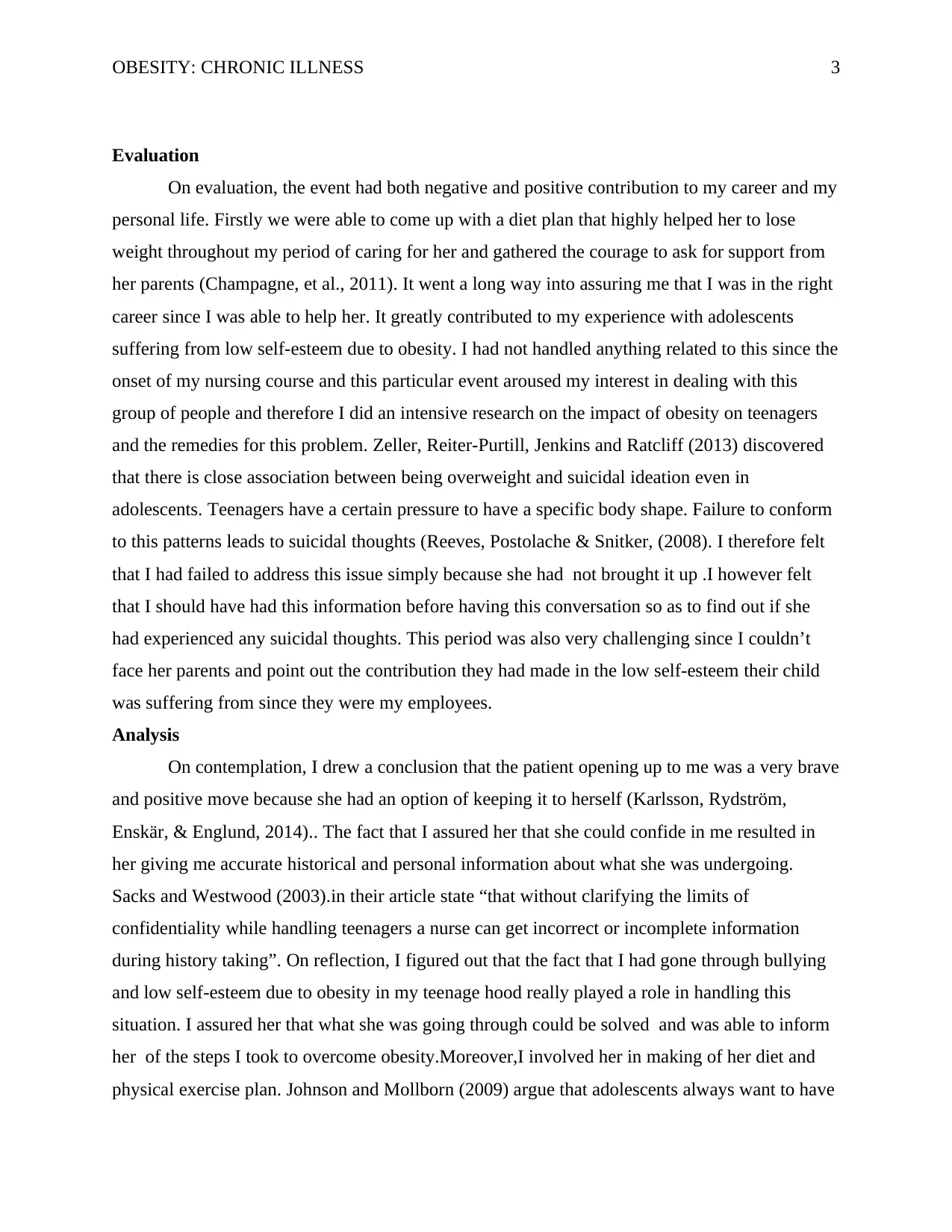
OBESITY: CHRONIC ILLNESS 3
Evaluation
On evaluation, the event had both negative and positive contribution to my career and my
personal life. Firstly we were able to come up with a diet plan that highly helped her to lose
weight throughout my period of caring for her and gathered the courage to ask for support from
her parents (Champagne, et al., 2011). It went a long way into assuring me that I was in the right
career since I was able to help her. It greatly contributed to my experience with adolescents
suffering from low self-esteem due to obesity. I had not handled anything related to this since the
onset of my nursing course and this particular event aroused my interest in dealing with this
group of people and therefore I did an intensive research on the impact of obesity on teenagers
and the remedies for this problem. Zeller, Reiter‐Purtill, Jenkins and Ratcliff (2013) discovered
that there is close association between being overweight and suicidal ideation even in
adolescents. Teenagers have a certain pressure to have a specific body shape. Failure to conform
to this patterns leads to suicidal thoughts (Reeves, Postolache & Snitker, (2008). I therefore felt
that I had failed to address this issue simply because she had not brought it up .I however felt
that I should have had this information before having this conversation so as to find out if she
had experienced any suicidal thoughts. This period was also very challenging since I couldn’t
face her parents and point out the contribution they had made in the low self-esteem their child
was suffering from since they were my employees.
Analysis
On contemplation, I drew a conclusion that the patient opening up to me was a very brave
and positive move because she had an option of keeping it to herself (Karlsson, Rydström,
Enskär, & Englund, 2014).. The fact that I assured her that she could confide in me resulted in
her giving me accurate historical and personal information about what she was undergoing.
Sacks and Westwood (2003).in their article state “that without clarifying the limits of
confidentiality while handling teenagers a nurse can get incorrect or incomplete information
during history taking”. On reflection, I figured out that the fact that I had gone through bullying
and low self-esteem due to obesity in my teenage hood really played a role in handling this
situation. I assured her that what she was going through could be solved and was able to inform
her of the steps I took to overcome obesity.Moreover,I involved her in making of her diet and
physical exercise plan. Johnson and Mollborn (2009) argue that adolescents always want to have
Evaluation
On evaluation, the event had both negative and positive contribution to my career and my
personal life. Firstly we were able to come up with a diet plan that highly helped her to lose
weight throughout my period of caring for her and gathered the courage to ask for support from
her parents (Champagne, et al., 2011). It went a long way into assuring me that I was in the right
career since I was able to help her. It greatly contributed to my experience with adolescents
suffering from low self-esteem due to obesity. I had not handled anything related to this since the
onset of my nursing course and this particular event aroused my interest in dealing with this
group of people and therefore I did an intensive research on the impact of obesity on teenagers
and the remedies for this problem. Zeller, Reiter‐Purtill, Jenkins and Ratcliff (2013) discovered
that there is close association between being overweight and suicidal ideation even in
adolescents. Teenagers have a certain pressure to have a specific body shape. Failure to conform
to this patterns leads to suicidal thoughts (Reeves, Postolache & Snitker, (2008). I therefore felt
that I had failed to address this issue simply because she had not brought it up .I however felt
that I should have had this information before having this conversation so as to find out if she
had experienced any suicidal thoughts. This period was also very challenging since I couldn’t
face her parents and point out the contribution they had made in the low self-esteem their child
was suffering from since they were my employees.
Analysis
On contemplation, I drew a conclusion that the patient opening up to me was a very brave
and positive move because she had an option of keeping it to herself (Karlsson, Rydström,
Enskär, & Englund, 2014).. The fact that I assured her that she could confide in me resulted in
her giving me accurate historical and personal information about what she was undergoing.
Sacks and Westwood (2003).in their article state “that without clarifying the limits of
confidentiality while handling teenagers a nurse can get incorrect or incomplete information
during history taking”. On reflection, I figured out that the fact that I had gone through bullying
and low self-esteem due to obesity in my teenage hood really played a role in handling this
situation. I assured her that what she was going through could be solved and was able to inform
her of the steps I took to overcome obesity.Moreover,I involved her in making of her diet and
physical exercise plan. Johnson and Mollborn (2009) argue that adolescents always want to have
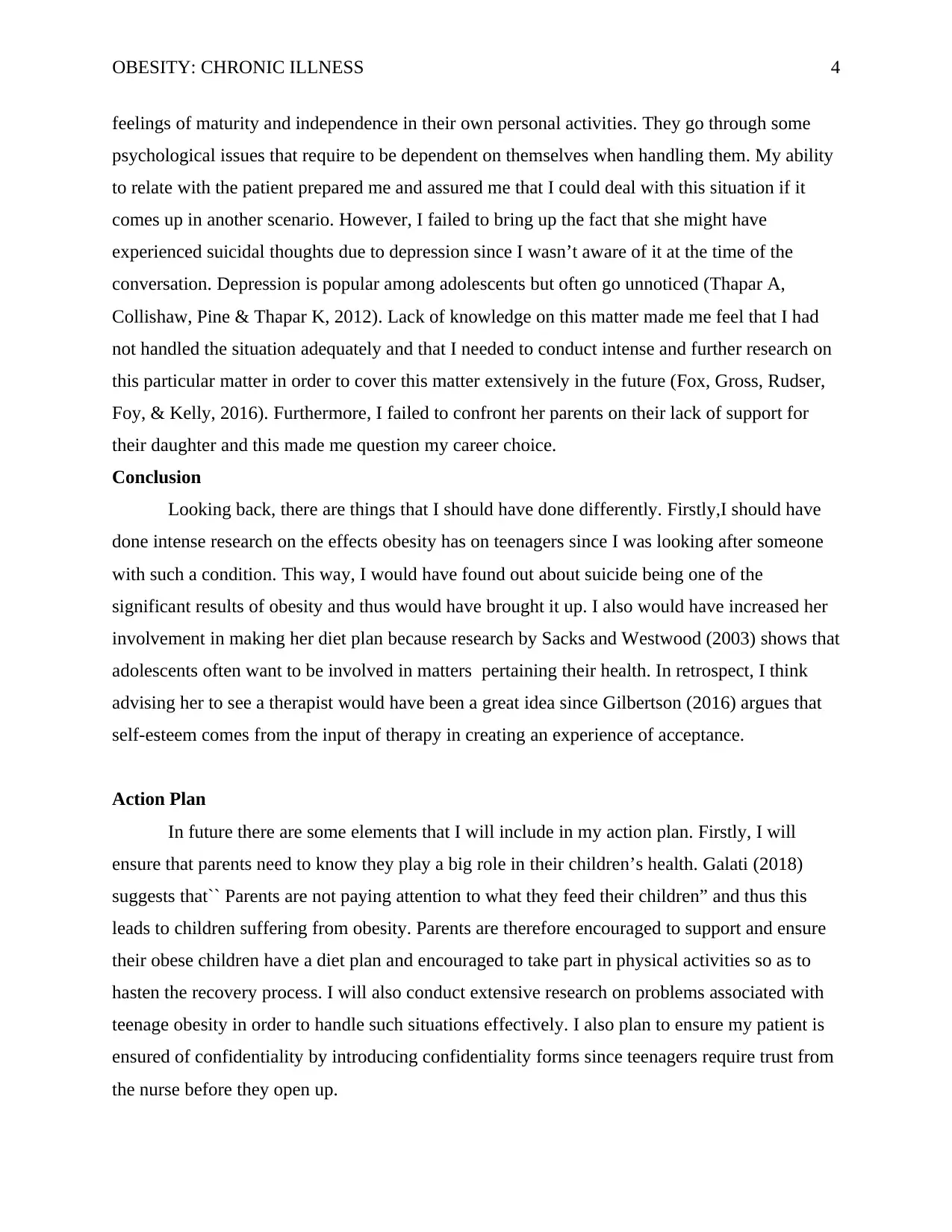
OBESITY: CHRONIC ILLNESS 4
feelings of maturity and independence in their own personal activities. They go through some
psychological issues that require to be dependent on themselves when handling them. My ability
to relate with the patient prepared me and assured me that I could deal with this situation if it
comes up in another scenario. However, I failed to bring up the fact that she might have
experienced suicidal thoughts due to depression since I wasn’t aware of it at the time of the
conversation. Depression is popular among adolescents but often go unnoticed (Thapar A,
Collishaw, Pine & Thapar K, 2012). Lack of knowledge on this matter made me feel that I had
not handled the situation adequately and that I needed to conduct intense and further research on
this particular matter in order to cover this matter extensively in the future (Fox, Gross, Rudser,
Foy, & Kelly, 2016). Furthermore, I failed to confront her parents on their lack of support for
their daughter and this made me question my career choice.
Conclusion
Looking back, there are things that I should have done differently. Firstly,I should have
done intense research on the effects obesity has on teenagers since I was looking after someone
with such a condition. This way, I would have found out about suicide being one of the
significant results of obesity and thus would have brought it up. I also would have increased her
involvement in making her diet plan because research by Sacks and Westwood (2003) shows that
adolescents often want to be involved in matters pertaining their health. In retrospect, I think
advising her to see a therapist would have been a great idea since Gilbertson (2016) argues that
self-esteem comes from the input of therapy in creating an experience of acceptance.
Action Plan
In future there are some elements that I will include in my action plan. Firstly, I will
ensure that parents need to know they play a big role in their children’s health. Galati (2018)
suggests that`` Parents are not paying attention to what they feed their children” and thus this
leads to children suffering from obesity. Parents are therefore encouraged to support and ensure
their obese children have a diet plan and encouraged to take part in physical activities so as to
hasten the recovery process. I will also conduct extensive research on problems associated with
teenage obesity in order to handle such situations effectively. I also plan to ensure my patient is
ensured of confidentiality by introducing confidentiality forms since teenagers require trust from
the nurse before they open up.
feelings of maturity and independence in their own personal activities. They go through some
psychological issues that require to be dependent on themselves when handling them. My ability
to relate with the patient prepared me and assured me that I could deal with this situation if it
comes up in another scenario. However, I failed to bring up the fact that she might have
experienced suicidal thoughts due to depression since I wasn’t aware of it at the time of the
conversation. Depression is popular among adolescents but often go unnoticed (Thapar A,
Collishaw, Pine & Thapar K, 2012). Lack of knowledge on this matter made me feel that I had
not handled the situation adequately and that I needed to conduct intense and further research on
this particular matter in order to cover this matter extensively in the future (Fox, Gross, Rudser,
Foy, & Kelly, 2016). Furthermore, I failed to confront her parents on their lack of support for
their daughter and this made me question my career choice.
Conclusion
Looking back, there are things that I should have done differently. Firstly,I should have
done intense research on the effects obesity has on teenagers since I was looking after someone
with such a condition. This way, I would have found out about suicide being one of the
significant results of obesity and thus would have brought it up. I also would have increased her
involvement in making her diet plan because research by Sacks and Westwood (2003) shows that
adolescents often want to be involved in matters pertaining their health. In retrospect, I think
advising her to see a therapist would have been a great idea since Gilbertson (2016) argues that
self-esteem comes from the input of therapy in creating an experience of acceptance.
Action Plan
In future there are some elements that I will include in my action plan. Firstly, I will
ensure that parents need to know they play a big role in their children’s health. Galati (2018)
suggests that`` Parents are not paying attention to what they feed their children” and thus this
leads to children suffering from obesity. Parents are therefore encouraged to support and ensure
their obese children have a diet plan and encouraged to take part in physical activities so as to
hasten the recovery process. I will also conduct extensive research on problems associated with
teenage obesity in order to handle such situations effectively. I also plan to ensure my patient is
ensured of confidentiality by introducing confidentiality forms since teenagers require trust from
the nurse before they open up.
Secure Best Marks with AI Grader
Need help grading? Try our AI Grader for instant feedback on your assignments.
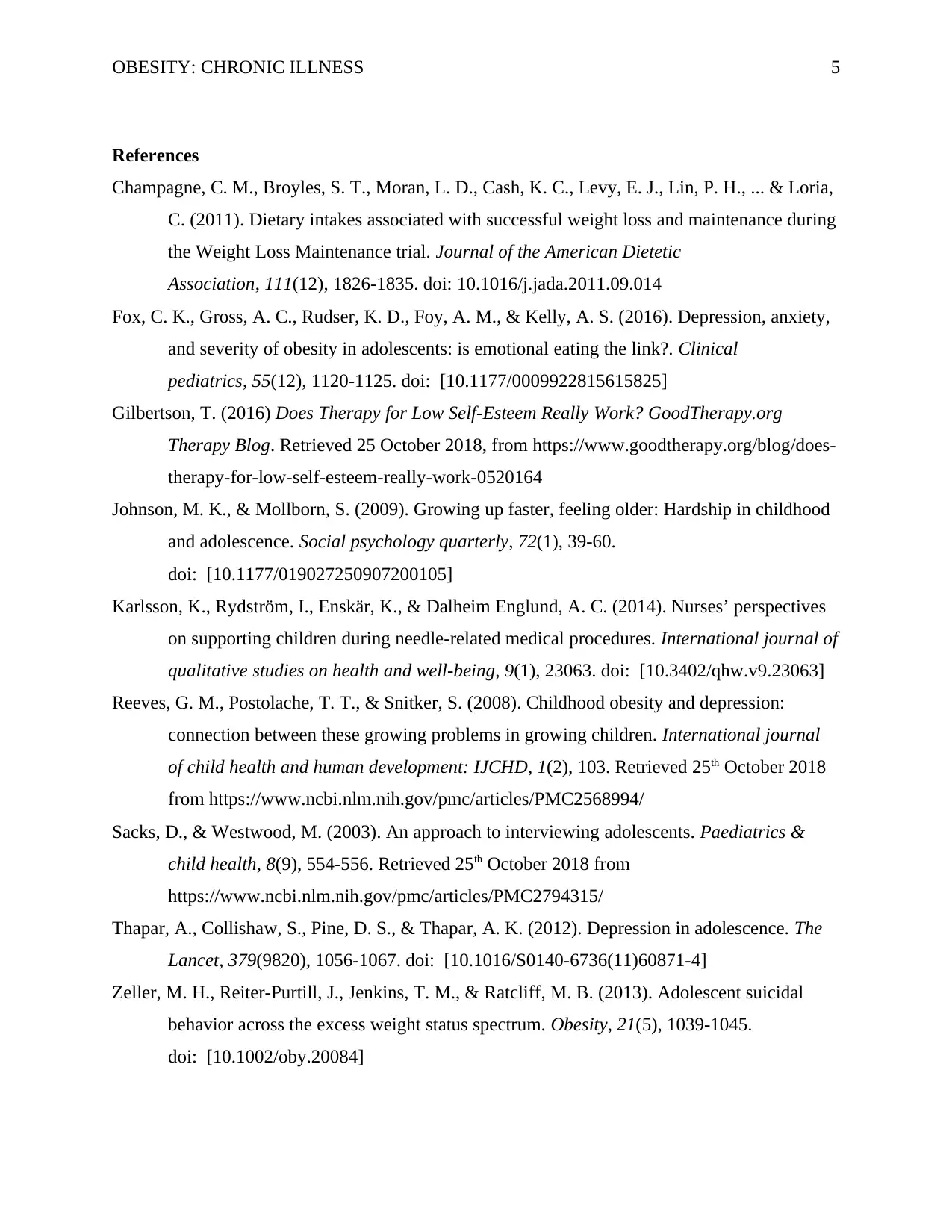
OBESITY: CHRONIC ILLNESS 5
References
Champagne, C. M., Broyles, S. T., Moran, L. D., Cash, K. C., Levy, E. J., Lin, P. H., ... & Loria,
C. (2011). Dietary intakes associated with successful weight loss and maintenance during
the Weight Loss Maintenance trial. Journal of the American Dietetic
Association, 111(12), 1826-1835. doi: 10.1016/j.jada.2011.09.014
Fox, C. K., Gross, A. C., Rudser, K. D., Foy, A. M., & Kelly, A. S. (2016). Depression, anxiety,
and severity of obesity in adolescents: is emotional eating the link?. Clinical
pediatrics, 55(12), 1120-1125. doi: [10.1177/0009922815615825]
Gilbertson, T. (2016) Does Therapy for Low Self-Esteem Really Work? GoodTherapy.org
Therapy Blog. Retrieved 25 October 2018, from https://www.goodtherapy.org/blog/does-
therapy-for-low-self-esteem-really-work-0520164
Johnson, M. K., & Mollborn, S. (2009). Growing up faster, feeling older: Hardship in childhood
and adolescence. Social psychology quarterly, 72(1), 39-60.
doi: [10.1177/019027250907200105]
Karlsson, K., Rydström, I., Enskär, K., & Dalheim Englund, A. C. (2014). Nurses’ perspectives
on supporting children during needle-related medical procedures. International journal of
qualitative studies on health and well-being, 9(1), 23063. doi: [10.3402/qhw.v9.23063]
Reeves, G. M., Postolache, T. T., & Snitker, S. (2008). Childhood obesity and depression:
connection between these growing problems in growing children. International journal
of child health and human development: IJCHD, 1(2), 103. Retrieved 25th October 2018
from https://www.ncbi.nlm.nih.gov/pmc/articles/PMC2568994/
Sacks, D., & Westwood, M. (2003). An approach to interviewing adolescents. Paediatrics &
child health, 8(9), 554-556. Retrieved 25th October 2018 from
https://www.ncbi.nlm.nih.gov/pmc/articles/PMC2794315/
Thapar, A., Collishaw, S., Pine, D. S., & Thapar, A. K. (2012). Depression in adolescence. The
Lancet, 379(9820), 1056-1067. doi: [10.1016/S0140-6736(11)60871-4]
Zeller, M. H., Reiter‐Purtill, J., Jenkins, T. M., & Ratcliff, M. B. (2013). Adolescent suicidal
behavior across the excess weight status spectrum. Obesity, 21(5), 1039-1045.
doi: [10.1002/oby.20084]
References
Champagne, C. M., Broyles, S. T., Moran, L. D., Cash, K. C., Levy, E. J., Lin, P. H., ... & Loria,
C. (2011). Dietary intakes associated with successful weight loss and maintenance during
the Weight Loss Maintenance trial. Journal of the American Dietetic
Association, 111(12), 1826-1835. doi: 10.1016/j.jada.2011.09.014
Fox, C. K., Gross, A. C., Rudser, K. D., Foy, A. M., & Kelly, A. S. (2016). Depression, anxiety,
and severity of obesity in adolescents: is emotional eating the link?. Clinical
pediatrics, 55(12), 1120-1125. doi: [10.1177/0009922815615825]
Gilbertson, T. (2016) Does Therapy for Low Self-Esteem Really Work? GoodTherapy.org
Therapy Blog. Retrieved 25 October 2018, from https://www.goodtherapy.org/blog/does-
therapy-for-low-self-esteem-really-work-0520164
Johnson, M. K., & Mollborn, S. (2009). Growing up faster, feeling older: Hardship in childhood
and adolescence. Social psychology quarterly, 72(1), 39-60.
doi: [10.1177/019027250907200105]
Karlsson, K., Rydström, I., Enskär, K., & Dalheim Englund, A. C. (2014). Nurses’ perspectives
on supporting children during needle-related medical procedures. International journal of
qualitative studies on health and well-being, 9(1), 23063. doi: [10.3402/qhw.v9.23063]
Reeves, G. M., Postolache, T. T., & Snitker, S. (2008). Childhood obesity and depression:
connection between these growing problems in growing children. International journal
of child health and human development: IJCHD, 1(2), 103. Retrieved 25th October 2018
from https://www.ncbi.nlm.nih.gov/pmc/articles/PMC2568994/
Sacks, D., & Westwood, M. (2003). An approach to interviewing adolescents. Paediatrics &
child health, 8(9), 554-556. Retrieved 25th October 2018 from
https://www.ncbi.nlm.nih.gov/pmc/articles/PMC2794315/
Thapar, A., Collishaw, S., Pine, D. S., & Thapar, A. K. (2012). Depression in adolescence. The
Lancet, 379(9820), 1056-1067. doi: [10.1016/S0140-6736(11)60871-4]
Zeller, M. H., Reiter‐Purtill, J., Jenkins, T. M., & Ratcliff, M. B. (2013). Adolescent suicidal
behavior across the excess weight status spectrum. Obesity, 21(5), 1039-1045.
doi: [10.1002/oby.20084]
1 out of 5
Related Documents
Your All-in-One AI-Powered Toolkit for Academic Success.
+13062052269
info@desklib.com
Available 24*7 on WhatsApp / Email
![[object Object]](/_next/static/media/star-bottom.7253800d.svg)
Unlock your academic potential
© 2024 | Zucol Services PVT LTD | All rights reserved.





